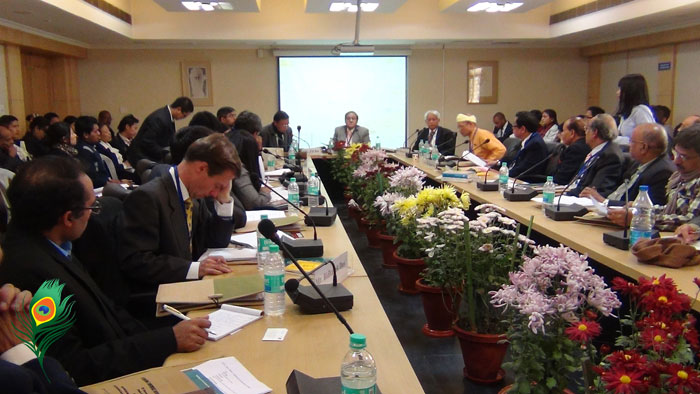Despite the progress in bilateral relations between the Burmese and Indian governments, other sectors of society are yet to catch up and must be promoted, said the Director of the Centre for Northeast Studies and Policy Research in Delhi, Dr. Sanjaya Baru.
 Speaking at the “Myanmar: Distant Neighbour” conference on Wednesday at the Jamia Millia Islamia University in the Indian capital, Dr. Baru pointed to recent diplomatic visits—by Burma’s President Thein Sein and opposition leader Aung San Suu Kyi to India; and by Indian Prime Minister Manmohan Singh to Burma in May—and said that other friendships need to be strengthened and enhanced.
Speaking at the “Myanmar: Distant Neighbour” conference on Wednesday at the Jamia Millia Islamia University in the Indian capital, Dr. Baru pointed to recent diplomatic visits—by Burma’s President Thein Sein and opposition leader Aung San Suu Kyi to India; and by Indian Prime Minister Manmohan Singh to Burma in May—and said that other friendships need to be strengthened and enhanced.
“In 2012, government-to-government relations are in progress, but we are still to see enough business-to-business and people-to-people relations,” ASEAN-India member Baru said.
Participants at the conference, including Indian research fellows, professors and delegates from Burma, discussed the geoeconomic significance of Burma as India’s “gateway” to Southeast Asia.
“However, challenging issues also exist and they must be seen carefully,” said former ambassador and Director General of the India Council of World Affairs, Rajiv Bhatia.
“The issues of ethnic Kachin, Rohingya and Chin human rights are still the focus of world countries,” he said. “And we are not yet clear what ‘disciplined democracy’ is. Is it a transitional period or the goal?
“And we need to know how the constitution can be amended. We hear about Aung San Suu Kyi frequently, but not about her party, the NLD. Whether there are second-line leaders ready to take over the leadership is questionable,” said Bhatia.
The Executive Director of the Institute for Peace and Social Justice, Dr. Thaung Htun, a Burmese, presented a paper on “Parliament, Parties and Power”.
He said, “The NLD could not hold party congresses in the past 20 years because of constant oppression by the governments, so they are now building their party at different levels and will hold their first party congress soon.
“The NLD has had to build their party by entirely relying on the personality cult of Aung San Suu Kyi,” he said.
Burmese writer Kyaw Win also presented a paper, titled “Myanmar Social-Political Value and Democratization” at the conference.
He summarized by saying that the world powers are showing keen interest in Burma affairs—“therefore we need to be cautious and careful,” he said.
Speaking to Mizzima on the sidelines of the conference, Kyaw Win said, “It is not only India, China and the US that have shown such a keen interest in our country’s affairs. The Indian speakers here [at the Delhi conference] have spoken about their country’s ‘Look East’ policy. If we deal with them well, the results will be good. If we don’t handle them efficiently and skillfully, we will be in danger.”
Sai Win Myint from the Shan Nationalities Democratic Party and Victor Biak Lian of the Euro-Burma Office also delivered addresses to delegates at the conference.


